Vesuvius India (NSE:VESUVIUS) Has A Pretty Healthy Balance Sheet

Warren Buffett famously said, 'Volatility is far from synonymous with risk.' So it seems the smart money knows that debt - which is usually involved in bankruptcies - is a very important factor, when you assess how risky a company is. As with many other companies Vesuvius India Limited (NSE:VESUVIUS) makes use of debt. But is this debt a concern to shareholders?
When Is Debt Dangerous?
Debt is a tool to help businesses grow, but if a business is incapable of paying off its lenders, then it exists at their mercy. In the worst case scenario, a company can go bankrupt if it cannot pay its creditors. However, a more frequent (but still costly) occurrence is where a company must issue shares at bargain-basement prices, permanently diluting shareholders, just to shore up its balance sheet. Of course, the upside of debt is that it often represents cheap capital, especially when it replaces dilution in a company with the ability to reinvest at high rates of return. When we think about a company's use of debt, we first look at cash and debt together.
See our latest analysis for Vesuvius India
What Is Vesuvius India's Debt?
You can click the graphic below for the historical numbers, but it shows that as of December 2023 Vesuvius India had ₹130.3m of debt, an increase on none, over one year. However, it does have ₹4.65b in cash offsetting this, leading to net cash of ₹4.52b.

How Strong Is Vesuvius India's Balance Sheet?
Zooming in on the latest balance sheet data, we can see that Vesuvius India had liabilities of ₹3.58b due within 12 months and liabilities of ₹373.8m due beyond that. Offsetting these obligations, it had cash of ₹4.65b as well as receivables valued at ₹3.31b due within 12 months. So it can boast ₹4.00b more liquid assets than total liabilities.
This short term liquidity is a sign that Vesuvius India could probably pay off its debt with ease, as its balance sheet is far from stretched. Simply put, the fact that Vesuvius India has more cash than debt is arguably a good indication that it can manage its debt safely.
On top of that, Vesuvius India grew its EBIT by 83% over the last twelve months, and that growth will make it easier to handle its debt. The balance sheet is clearly the area to focus on when you are analysing debt. But it is future earnings, more than anything, that will determine Vesuvius India's ability to maintain a healthy balance sheet going forward. So if you're focused on the future you can check out this free report showing analyst profit forecasts.
Finally, while the tax-man may adore accounting profits, lenders only accept cold hard cash. While Vesuvius India has net cash on its balance sheet, it's still worth taking a look at its ability to convert earnings before interest and tax (EBIT) to free cash flow, to help us understand how quickly it is building (or eroding) that cash balance. Over the last three years, Vesuvius India recorded negative free cash flow, in total. Debt is far more risky for companies with unreliable free cash flow, so shareholders should be hoping that the past expenditure will produce free cash flow in the future.
Summing Up
While it is always sensible to investigate a company's debt, in this case Vesuvius India has ₹4.52b in net cash and a decent-looking balance sheet. And it impressed us with its EBIT growth of 83% over the last year. So we don't think Vesuvius India's use of debt is risky. Above most other metrics, we think its important to track how fast earnings per share is growing, if at all. If you've also come to that realization, you're in luck, because today you can view this interactive graph of Vesuvius India's earnings per share history for free.
If, after all that, you're more interested in a fast growing company with a rock-solid balance sheet, then check out our list of net cash growth stocks without delay.
New: Manage All Your Stock Portfolios in One Place
We've created the ultimate portfolio companion for stock investors, and it's free.
• Connect an unlimited number of Portfolios and see your total in one currency
• Be alerted to new Warning Signs or Risks via email or mobile
• Track the Fair Value of your stocks
Have feedback on this article? Concerned about the content? Get in touch with us directly. Alternatively, email editorial-team (at) simplywallst.com.
This article by Simply Wall St is general in nature. We provide commentary based on historical data and analyst forecasts only using an unbiased methodology and our articles are not intended to be financial advice. It does not constitute a recommendation to buy or sell any stock, and does not take account of your objectives, or your financial situation. We aim to bring you long-term focused analysis driven by fundamental data. Note that our analysis may not factor in the latest price-sensitive company announcements or qualitative material. Simply Wall St has no position in any stocks mentioned.
About NSEI:VESUVIUS
Undervalued with excellent balance sheet and pays a dividend.
Similar Companies
Market Insights
Community Narratives



